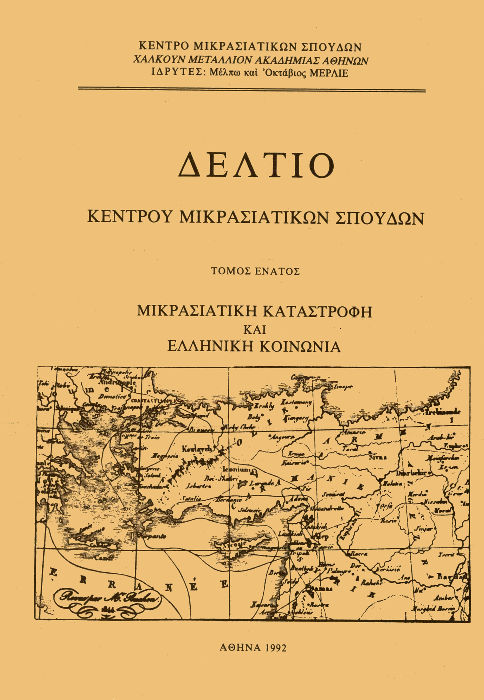Το κίνημα ανεξαρτησίας του Πόντου και οι αυτόνομες Ελληνικές περιοχές στη Σοβιετική Ένωση του μεσοπολέμου
Περίληψη
Economic circumstances since the mid-nineteenth century, favoured the
rapid development of Pontic Greek society and culture on the Northern littoral
of Asia Minor and its immediate hinterland. The Pontic Greek merchants
managed to achieve a leading role in the economic life of the Black Sea region.
This development ran parallel to similar phenomena in the Greek communities
on the Russian coast of the Black Sea and in the interior of Transcaucasia.
The end of the period of Pontic development coincides with the First World
War. As a reaction to Ottoman policies threatening their security and survival,
the Pontic Greeks resorted to the formation of an organisation for dynamic
resistance. In every region of Pontos, secret resistance groups were established.
The same phenomenon is observable among the Greek communities of Southern
Russia. The main objective of these groups was the creation of an independent
republic based on the Pontic territories of the Ottoman Empire.
The October Revolution in Russia changed completely the scene by bringing
to power a government friendly towards Turkish interests.
Following the defeat of the Central Powers in World War I, the hopes of
the Pontic Greeks were rekindled. The two interdependent objectives, the creation
of an independent republic in the Pontos and the achievement of autonomy
in the territory of the former Russian Empire for local Greek populations,
set in motion a large scale Pontic political movement.
The defeat of the Greek army in Asia Minor in 1922 however and the
Lausanne Treaty of 1923 sealed the fate of the Pontic movement in Turkey.
Greek rebels nevertheless continued to fight for their cause on the Pontic
mountains for a year after Lausanne. Those who survived sought refuge in the
new Soviet Union.
In the multinational Soviet Union the Pontic movement focused on the
achievement of cultural and educational rights. A short movement for autonomy
that surfaced at the end of the 1920s was difinitively defeated in 1937 in
the context of the broader Stalinist policies of the period.
Λεπτομέρειες άρθρου
- Πώς να δημιουργήσετε Αναφορές
-
Αγτζίδης Β. (1992). Το κίνημα ανεξαρτησίας του Πόντου και οι αυτόνομες Ελληνικές περιοχές στη Σοβιετική Ένωση του μεσοπολέμου. Δελτίο Κέντρου Μικρασιατικών Σπουδών, 9, 157–196. https://doi.org/10.12681/deltiokms.135
- Τεύχος
- Τόμ. 9 (1992)
- Ενότητα
- Άρθρα

Αυτή η εργασία είναι αδειοδοτημένη υπό το CC Αναφορά Δημιουργού – Μη Εμπορική Χρήση – Παρόμοια Διανομή 4.0.
Οι συγγραφείς των άρθρων που δημοσιεύονται στο Δελτίο διατηρούν τα δικαιώματα πνευματικής ιδιοκτησίας επί των άρθρων τους, δίνοντας στο περιοδικό το δικαίωμα της πρώτης δημοσίευσης. Άρθρα που δημοσιεύονται στο Δελτίο διατίθενται με άδεια Creative Commons 4.0 και σύμφωνα με την άδεια μπορούν να χρησιμοποιούνται ελεύθερα, με αναφορά στο/στη συγγραφέα και στην πρώτη δημοσίευση για μη κερδοσκοπικούς σκοπούς και με δικαίωμα τροποποίησης μόνον με παρόμοια διανομή (αν αναμείξετε, τροποποιήσετε, ή δημιουργήσετε πάνω στο υλικό, πρέπει να διανείμετε τις δικές σας συνεισφορές υπό την ίδια άδεια όπως και το πρωτότυπο).


